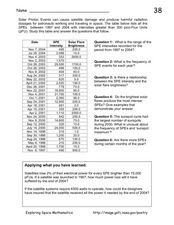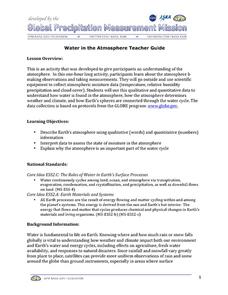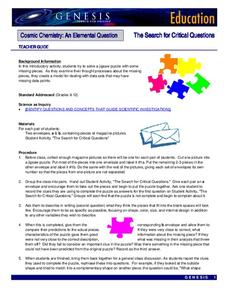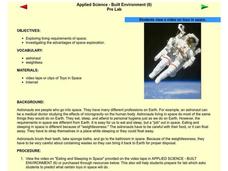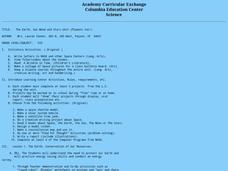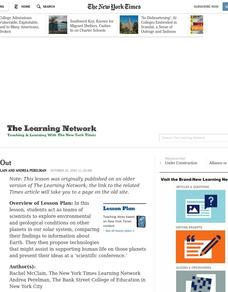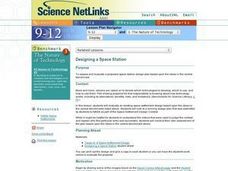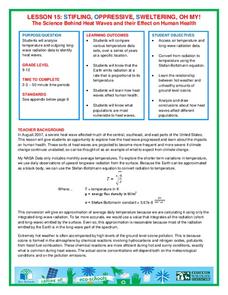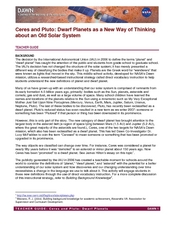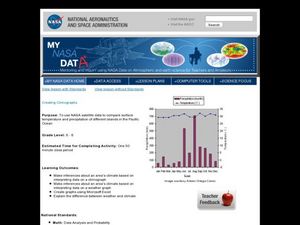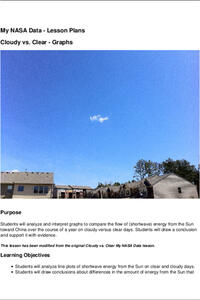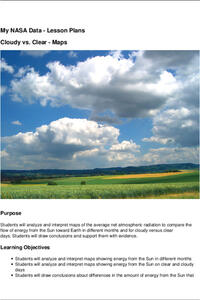Curated OER
Background Radiation and Lifestyles
In this radiation and lifestyles worksheet, students are given 5 problems about a person which indicate her exposure to radiation. Students calculate her total dosage to radiation in each problem based on her exposure.
Curated OER
Solar Proton Events
On this worksheet, space scientists use a data table to answer questions about the relationship between the brightness of solar flares and the intensity of the solar proton events. They apply what they learned from the data to address...
Curated OER
Water in the Atmosphere
A slide show serves as the backdrop for a instructional activity on the moisture in Earth's atmosphere. Through it, mini meteorologists learn about the attributes of the atmosphere and actually use data-collecting weather tools to make...
Chicago Botanic Garden
Climate Change Impacts on Ecosystem Services
The fourth activity in a series of five has classes participate in a jigsaw to learn about global impacts of climate change and then share their new information with a home group. Groups then research impacts of climate change (droughts,...
Chicago Botanic Garden
Causes and Effects of Climate Change
It's time for your class to literally show what they know! Pupils illustrate what they learned about the causes and effects of climate change by filling out a graphic organizer to complete the 5-part series of lessons. They discuss them...
Chicago Botanic Garden
Introducing Ecosystem Services
Ecosystems provide many things humans not only use but also need in order to survive. The last instructional activity in the series of seven introduces scholars to the idea of ecosystem services, that ecosystems provide humans with many...
NASA
Development of a Model: Analyzing Elemental Abundance
How do scientists identify which elements originate from meteorites? Scholars learn about a sample of material found in a remote location, analyzing the sample to determine if it might be from Earth or not. They study elements, isotopes,...
NASA
The Search for Critical Questions
A puzzle isn't about the individual pieces, but how they work together. Scholars assemble a puzzle and discover missing pieces. They write a description of what they expect these pieces to look like, including as many details as...
Curated OER
Living in Space
Students explore space science by viewing a video in class. In this astronaut lesson, students identify the living habits of astronauts by researching the NASA website and observing a space science video in class. Students participate in...
Curated OER
The Earth, Sun, Moon, And Stars
Fifth graders explore the solar system. In this solar system unit, 5th graders investigate numerous projects while rotating through learning centers. Students write about space and construct a space shuttle model. Students practice map...
Curated OER
Spacing Out
Students explore environmental and geological conditions on other planets in our solar system, comparing their findings to information about Earth. They propose technologies that might assist in supporting human life on those planets.
Curated OER
Designing a Space Station
Students view pictures of the space station and discuss their feelings about living in a space station. They discuss the materials needed to build a space station and its various needs for operation. They read the NASA contest rules...
NASA
Soda Straw Rockets
Three, two, one, blast off to a better understanding of force and motion with this exciting science instructional activity! Beginning with a discussion about rockets and gravity, young scientists go on to complete a series of worksheets...
National Wildlife Federation
Stifling, Oppressive, Sweltering, Oh My!
Looking for a hot date? Pick any day in August, statistically the hottest month in the United States. The 15th lesson in the series of 21 instructs pupils to investigate the August 2007 heat wave through NASA data, daily temperature...
Curated OER
Worksheet 19: Ship Positions
In this math worksheet, learners read informational paragraphs and then answer 18 questions using data from their readings. Questions are about vectors, positions, distance and orbits.
PHET
Measuring the Interplanetary Magnetic Field
Scientists need to figure out how to measure interplanetary magnetic fields, but the magnetic field of the spacecraft is interfering with their readings. Scholars attempt to solve the problem that has perplexed NASA scientists for years.
Curated OER
Ceres and Pluto: Dwarf Planets as a New Way of Thinking about an Old Solar System
Learners examine the new categories of planets and how planets were reclassified. In this solar system lesson students complete activities using Venn diagrams and images of planets.
National Wildlife Federation
Wherefore Art Thou, Albedo?
In the sixth lesson in a series of 21, scholars use NASA data to graph and interpret albedo seasonally and over the course of multiple years. This allows learners to compare albedo trends to changes in sea ice with connections to the...
Curated OER
Learning about Fossils
Students explain the difficulty that paleontologists have in assembling fossil bones. Hard cookies are used to simulate dinosaur bones/fossils. They research the Apatosaurus and discuss paleontology.
Curated OER
Creating Climographs
Students use satellite data to compare precipitation and surface temperatures on different islands. In this satellite lesson students create graphs and explain the differences between weather and climate.
NASA
Using Models in Climate Change Research
Explore models through the relevant lens of climate change! Investigators watch a video about using models and their application for evaluating temperature data and climate change. Scientists read an article on climate change and answer...
NASA
Cloudy vs. Clear - Graphs
Explore the link between solar energy and cloud cover using real data from NASA from China! Future climatologists analyze and interpret graphs of solar energy on clear and cloudy days using a literacy cube. Investigators draw conclusions...
Chicago Botanic Garden
Migration, Adaptation, and Changing Climates
People adjust to their environments without even thinking about it—even if it's simply throwing on a sweatshirt. Lead the class in a discussion about the adjustments people make in their daily lives as an introduction to adaptations,...
NASA
Cloudy vs. Clear - Maps
Find out the science of how clouds keep Earth cooler on hot days. Using guided discussions, investigators analyze and interpret maps of how much solar energy Earth receives at different times of the year. Participants draw conclusions...



